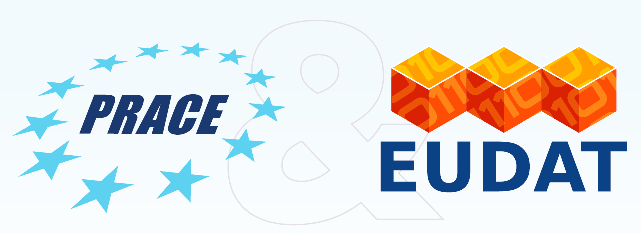 EUDAT and PRACE are joining forces to help research communities gain access to high quality managed e-Infrastructures whose resources can be connected together to enable cross-utilization use cases and make them accessible without any technical barrier.
EUDAT and PRACE are joining forces to help research communities gain access to high quality managed e-Infrastructures whose resources can be connected together to enable cross-utilization use cases and make them accessible without any technical barrier.
The capability to couple data and compute resources together is considered one of the key factors to accelerate scientific innovation and advance research frontiers. This collaboration has already achieved relevant results as six cross-projects, from different scientific fields, have been granted to use approximately 400TB of storage space at different EUDAT centres. These projects, granted during the PRACE DECI Call 13 and PRACE DECI Call 14, have been using EUDAT storage resources to secure the results of their computational experiments and can build on this result to create a long-term repository of valuable data for further elaboration and dissemination.
Thanks to this collaborative effort, the PRACE DECI Call 17 welcomes new joint project proposals requiring to couple PRACE Tier-1 resources with services for long-term data management and preservation. EUDAT offers around 1 PB (1000 TiB) of storage capacity, approximately 150 TiB per project awarded at one or more of its sites distributed across Europe until June 2023, free of charge supported by the DICE project (GA #101017207).
How will the projects be selected?
All projects will be assessed for technical feasibility. Then, in case more requests than available resources will be received, projects will be categorized on the basis of their estimated level of technical complexity, the amount of requested resource and the long-term strategy.
Proposals will be shortlisted according to the following criteria:
- Technical feasibility with regard to the availability of storage and network capacities and capabilities which can be provided via EUDAT,
- Expected benefits of the project for the immediate research community,
- Expected benefits for European researchers beyond the immediate research community from which the project originates, and
- Contribution to Open Access.
Further to the storage resources, experts will work to facilitate integration and use of its data services for finding, sharing, storing, replicating, staging and performing computations with primary and secondary research data.
Frequently asked questions
Q1: Which kind of data I can deposit onto EUDAT resources?
A1: Any kind of structured or unstructured data are allowed. The EUDAT B2SHARE service is also able to manage metadata records and can be extended to support your own metadata schema.
Q2: How can I transfer data?
A2: EUDAT supports two main transfer protocols, GridFTP and HTTP.
Q3: What’s a Data Management Plan (DMP)?
A3: The DMP is a useful instrument for researchers to reflect on and communicate about the way they will deal with their data. It prompts them to think about how they will generate, analyse and share data during their research project and afterwards.
Q4: Will my data be secretly mint or manipulated to collect statistics or extract new insights from them?
A4: No, EUDAT ensures integrity and stewardship of all stored data. The EUDAT infrastructure is based on trustworthy partners.
Q5: Does EUDAT provide any material, such as documentation, on how its services work?
A7: Yes, the user documentation is available here.
Q6: Who are the communities EUDAT is working with?
A6: Since the beginning the collaboration with research communities has been one of the EUDAT constituent pillars. The list of active collaborations is available here.
Q7: Does EUDAT provide support to communities?
A7: Yes, EUDAT has a dedicated support helpdesk for all its services. In addition, during the enabling phase, a dedicated amount of manpower will be allocated to facilitate services uptake and use. Requests for support can be submitted via this web form.
